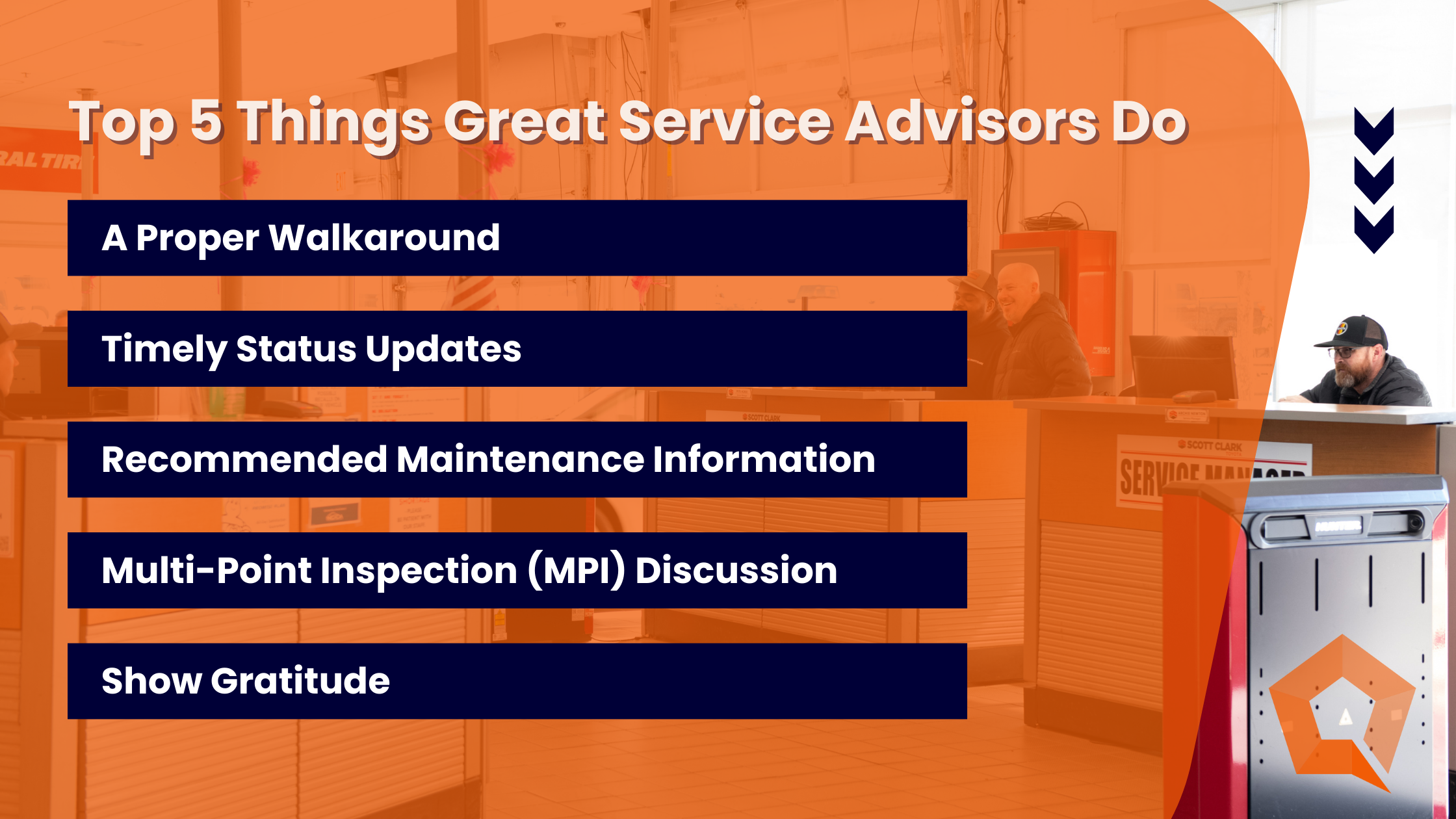In the world of automotive service advising, the distinction between good and great lies not just in technical know-how, but in the art of building relationships and trust. In this blog post, we’ll share five key practices that elevate service advisors from being merely transactional to becoming true advocates for both their customers and their vehicles.
1. A Proper Walkaround: Great service advisors don’t view the walkaround as a chore. Nor do they see it as a compliance mandate to protect against damage claims or as a way to manipulate people into buying something with fake reactions to tire tread depth, for example. Great advisors say it is their time away from a computer to ask questions, listen to the customer, get caught up with them and the vehicle after six, nine or even twelve months since they saw the customer last. They know this is their moment to re-establish trust and to be the advocate for the customer’s vehicle which brings retention for the dealership.
PRO TIP FROM ADVISORS: Top service advisors have one or two questions they always use to get people to share a bit. For example, “David, the good news is that your Honda hasn’t needed anything since the last service visit about 10 months ago. The bad news is that I’ve lost track of how you are doing – what’s been the most exciting thing in the last year?”
2. Timely Status Updates: Great service advisors avoid the huge pitfall for CSI (Customer Satisfaction Index) and retention by communicating early (when the customer is at the store) and on time (when the customer is back at home or their office). Advisors need to be able to efficiently communicate via a variety of tools, depending on the customer’s preferences, where the customer's vehicle is in the repair process. This is the most common complaint and can make up a huge percentage of inbound calls to the service drive.
PRO TIP FROM ADVISORS: Organization and time management is their secret to success – they know they need it and embrace it.
3. Recommended Maintenance Information: Top service advisors prepare in advance and know the specific recommended maintenance for the customer. If a customer is coming in for an oil change, yes it can be difficult to discuss the time expectations to increase it to a factory recommended maintenance interval – BUT they don’t skip it, they know they can always schedule them for an additional visit. Great advisors try to discuss this ahead of the appointment (or have their BDC team do it). This limits friction in the amount of time expected to have the vehicle in service.
PRO TIP FROM ADVISORS: Communicating with clients – most people don’t understand WHY they need the work completed, and great advisors make the WHY connection and invest in building the value.
4. Multi-Point Inspection (MPI) Discussion: Great advisors know it is important to discuss the Red/Yellow items on an MPI, but they also invest time discussing all the things that look great on the vehicle at the time of service. They build trust by discussing the items on the vehicle that the store pays attention to but are not needed at this time.
PRO TIP FROM ADVISORS: They prepare the customer for what’s next as well. They know people have budgets and they aren’t afraid to talk about what is six months or nine months out to help the customer plan ahead for that next appointment.
5. Show Gratitude: Top service advisors don’t forget to thank the customer for their business. At the end of the visit, the advisor often jumps straight into the CSI score discussion on surveys but doesn't really thank the customer for doing business with the store or with the advisor. Building relationships starts with showing gratitude.
PRO TIP FROM ADVISORS: They put a thank you note in the car or a small gift of some kind - they make it personal.
BONUS – Warranty Knowledge: Great service advisors understand the warranty. A big issue that happens in service departments is that an advisor doesn't bother or doesn't have access to warranty screens to determine if a repair or service is eligible for OEM or after-market coverage purchased at the dealership. This erodes credibility quickly if the customer feels like the dealership doesn't know what products were purchased in finance.
In the fast-paced business of automotive servicing, the role of an advisor should extend far beyond transactional interactions. Effective advisors should nurture trust, provide helpful information, and empower their customers to make informed decisions. By engaging in meaningful walkarounds, providing comprehensive status updates, discussing maintenance needs, and expressing gratitude, great advisors bridge the gap between technical expertise and human connection. They serve as custodians of a service experience that not only maintains vehicles but also builds lasting relationships, turning routine maintenance into a memorable interaction.
